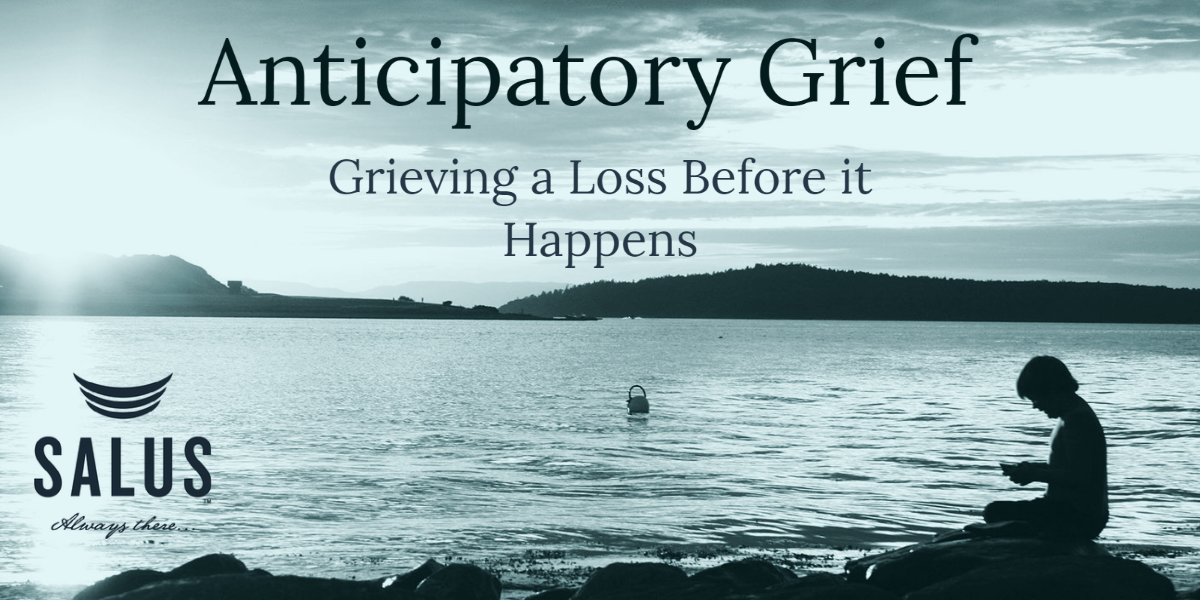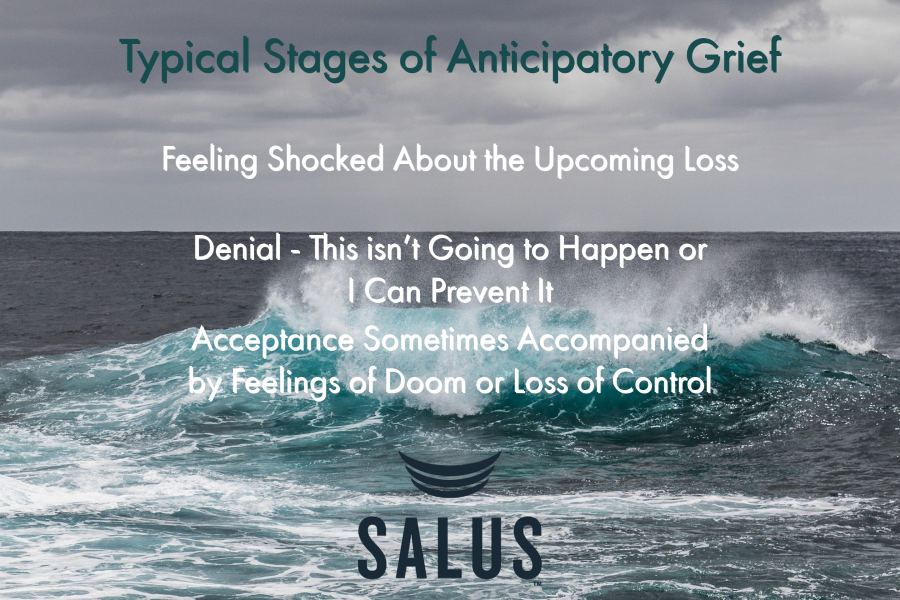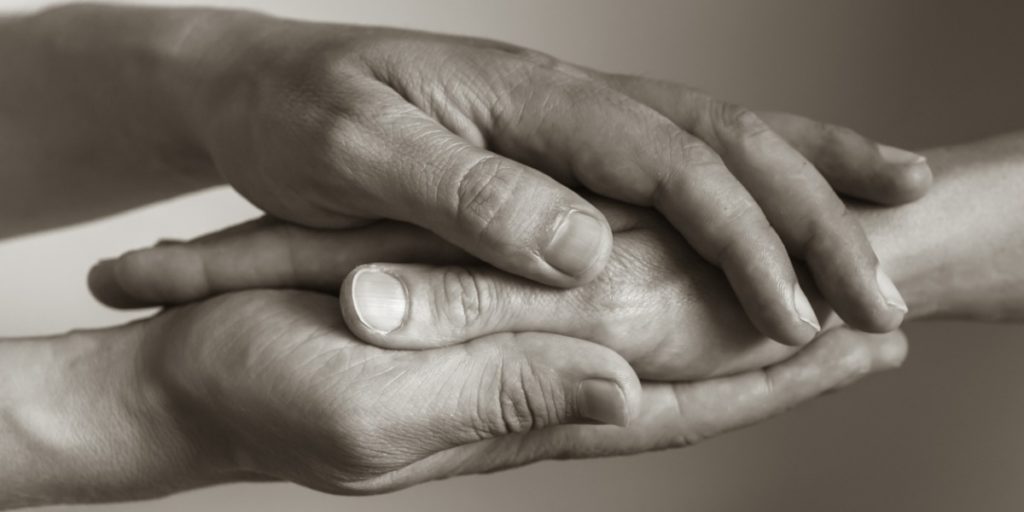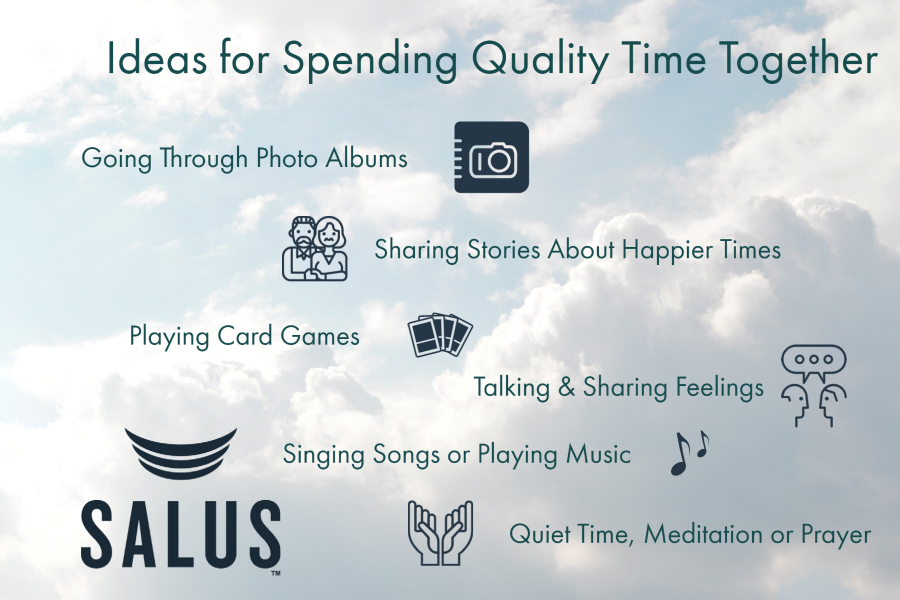
Grief is often something we think of as happening after we lose someone we love. However, there are multiple types of grief, and grief can occur at any time. It might occur in the earliest stage of an illness, after a loss, in the weeks or months leading up to a loss, or even when a loss isn’t guaranteed.
One common and oftentimes misunderstood form of grief is anticipatory grief.
Anticipatory grief occurs before a person passes away. This type of grief is often confusing or uncomfortable. It’s especially common when a friend or family member is suffering from a long-term or incurable illness. Anticipatory grief is somewhat misunderstood and frequently mistaken for some of its symptoms – sadness, anxiety or depression. It is often experienced when you know that a loss is coming but don’t yet know exactly when that loss will occur or what that loss will look or feel like.
Conventional Grief vs. Anticipatory Grief
Grief before and after a loss is similar, but there are also some distinct differences between these types of grief. Anticipatory grief typically involves more anger and a greater loss of emotional control. Think of it as an in between place. Your body and mind don’t quite know how to react, and therefore, might react in a way that’s considered atypical.
With this type of grief, there is often increased concern for the person who is dying. You might visualize your loved one’s death and feel a strong, almost uncontrollable need to prepare for life after the loss. Some people experience an urgent need to attend to unfinished business, both financial and personal.
What Does Anticipatory Grief Mean and Look Like?
Grief is a process, and while it sometimes looks different from person to person, most people will experience certain stages.

Something that complicates anticipatory grief is that, in addition to worrying about the impending loss of this person, you might worry about things that are impacting you right now such as:
- Finances
- Lack of a Social Life
- Unavoidable Changes in Your Routine
- How Your Role in the Family has Shifted
- Loss of Companionship that You’re Experiencing if Your Loved One is Incapacitated
- The Loss of Opportunity; Even a Missed Opportunity to Enjoy an Upcoming Family Gathering or Vacation that You Planned
These things can all feel tragic, hopeless and as if you’ve completely lost control.
Coping with anticipatory grief is challenging, but it is made easier when a person seeks help as soon as possible. Recognizing the symptoms of anticipatory grief is the first step.
What Are Symptoms of Anticipatory Grief?

Frequently Feeling On Edge
There’s a sense of dread that might almost consume you; a feeling as if something terrible is right around the corner and you have no control over it and don’t yet completely understand it. You might be hyper aware of certain things (perhaps your loved one’s breathing patterns, a more frequent cough, or even the slightest changes in their skin color) and hypervigilant about having someone else recognize, address or even “fix” these issues.
Difficulty Making Decisions
Even what you once considered simple day-to-day decisions feel impossible. It’s almost as if you freeze up just by being presented with them. You worry that one wrong move might change the course of your loved one’s condition for the worse, speed up the progression of their illness or bring about more pain or discomfort.
Guilt
Guilt involves finding yourself constantly internalizing and asking questions like “is this my fault,” or “could I have done something different?” even though your logical self knows that the blame doesn’t belong to you. A lot of things that you logically know you can’t control might bring about feelings of anger, doubt, frustration and guilt.
Loneliness
You find yourself feeling alone even in a room full of people. Loneliness is even self-initiated because it’s easier to withdraw from others, avoid well-meaning phone calls from people who are checking in or offering help, or somehow retreat into a perceived “protective” state. It is also sometimes the result of unrealistically thinking that if you avoid the problem, it will go away.
Physical Side Effects
Sleep difficulties, a lessened desire to eat or drink appropriately, stomach pains, heart palpitations, muscle aches, and headaches are all common symptoms of anticipatory grief. Some individuals also experience memory loss or forgetfulness. While these are normal symptoms, it is important to discuss them with your doctor, especially if they are impacting your livelihood and day-to-day life.
Preparation for the Worst
This involves mentally preparing for the “worst”. You might rehearse the death in your mind. What will it look or feel like? Where will you be when your loved one passes? By pretending that the worst is inevitable and actively seeking out a state of emotional numbness, you perceive it as easier to deal with shock and pain. Instead, this often creates a state of hopelessness that can prevent you from enjoying the remaining time with a loved one, accomplishing the things you hope to accomplish, and continuing to make new memories that can live on and create a more positive end of life experience.
Grieving for Someone Who is Still Alive Our Response to Trauma
So much about anticipatory grief is simply our body’s trauma response and natural inclination to enter “fight, flight, or freeze” mode when someone we love is still alive but in what we perceive as a perilous situation. Our body is flooded with stress hormones which elicits a chemical response in anticipation of having to quickly react to some kind of perceived threat. However, when we choose to continue to expect, seek out, or even on some level welcome the negative symptoms of anticipatory grief without engaging our healthier coping mechanisms, it’s easy to become overwhelmed and exhausted and to feel as if we’ve lost control.
Tools for Understanding and Working Through Grief

When experiencing anticipatory grief, it’s common to believe it is socially unacceptable to express your pain or seek out support. Remember that grief is normal (even anticipatory grief). Acknowledging this and working through your feelings can help you to build coping skills and react to anticipatory grief in a more positive way. In fact, research shows that there is great value in using the tools that are at your disposal to, in a healthy way, process the idea that your loved one will die and progress through the bereavement process, both before and after the death occurs.
Counseling
Isolation in grief can cause pain to linger and in time escalate. Even if it’s difficult to do so, reach out and talk to someone. Conversations with family and friends are helpful, but nothing replaces professional counseling. If your loved one is in hospice care, counseling is available to you. Trained hospice social workers, grief counselors, and chaplains are there for patients and family caregivers. They are trained to help you better understand anticipatory grief and develop or refine your own coping skills and survival mechanisms.
In addition to offering patient and family counseling support, Salus Hospice social workers have access to a network of resources including reading materials, support groups, community programs and other helpful tools. They often refer family caregivers to in person or virtual grief support groups as a compliment to professional counseling. Grief support groups provide a level of comfort and belonging that is only found when connecting with others who are experiencing what you’re experiencing.
Information and Understanding
Open communication with your loved one’s primary physician or hospice doctor offers many benefits and can help in overcoming anticipatory grief. These professionals have a professional understanding of the symptoms of your loved one’s illness and the potential side effects of any medications administered for pain and discomfort. They can provide information on the course of the illness, help you to better understand what to expect during each stage, and offer valuable, expert support when you’re feeling uncertain or anxious about symptoms or side effects.
Gaining awareness about your loved one’s life limiting illness provides some sense of control, and it gives you a greater ability to empathize with all that your loved one is going through. If you’re not quite comfortable having direct conversations with your loved one’s doctor, a hospice nurse or social worker is an excellent resource to use. These professionals act as your advocate and a knowledgeable go-between. They ensure that your questions and concerns are addressed quickly and information is delivered in a way that you understand.
Expressing Yourself
Some people find comfort in using art or journaling to express their grief and channel their feelings. Prayer is another resource often used by people who are suffering. All of these are examples of positive ways to release feelings of anger, sadness, frustration or guilt as you work toward normalizing the anticipatory grief process.
Expressing Forgiveness
In some cases, anticipatory grief is brought about when a person has experienced a strained relationship with the person they are losing. They might feel regret, anger, or an urgency to complete unfinished business. This is sometimes accompanied by a belief that there is no time to address matters. While it is often difficult to navigate through these emotions, there is proven benefit. So, take a moment to say “I love you,” “I forgive you,” or “I’m sorry.” This is an opportunity to make amends. Let go and move toward finding the space to enjoy your final time together in a healthy way. A hospice social worker or chaplain can help to facilitate these sometimes delicate or difficult conversations and keep everyone feeling safe.
Spending Quality Time Together
Making the most of your time together is vital in maintaining a healthier outlook. While it’s important to discuss final affairs, also make time for activities that are meaningful to both of you.

Overcoming Guilt
It’s easy to put your life on hold when a loved one is diagnosed with a life-limiting illness. However, it’s also important to make time for you. Maintain your own health and well being. If it feels right, make some preparations for a life without your loved one. Try to occasionally take time away from your loved one’s bedside. Use this time to see friends, rest, exercise, attend to your own medical appointments. You might also attend church, or manage work and other family matters.
Take advantage of respite care offered by your hospice provider in order to have someone at your loved one’s bedside. This helps most people to feel more comfortable while focusing on their own needs. Respite helps you to reconnect with yourself. It makes it easier to clear your head. Time alone also improves your physical and mental outlook. By taking advantage of some respite, you’ll feel prepared to be present for your loved one when they need you the most.
Can Anticipatory Grief Be Beneficial?
Anticipating a loss won’t necessarily prevent you from experiencing grief after the loss or even shorten conventional grief. However, it does serve a purpose. Anticipatory grief often prompts discussions about and action on important end of life planning tasks. It also provides you with opportunities to grieve incremental losses along the way. This can make adjusting to an eventual loss easier. You might also discover the importance of and opportunities for closure, reconciliation and forgiveness. Some studies confirm that anticipatory grief helps individuals to find meaning in their situation prior to the loss and closure.
The most important thing to remember is to make your anticipatory grief experience a healthy one. Recognize this as the normal part of the process that it is. Take care of yourself. Utilize the tools at your disposal. Welcome the family support that Salus Hospice offers. Taking these steps will make this challenging time and your grieving period a little easier. Remember, if you need us, we’re here to help.

